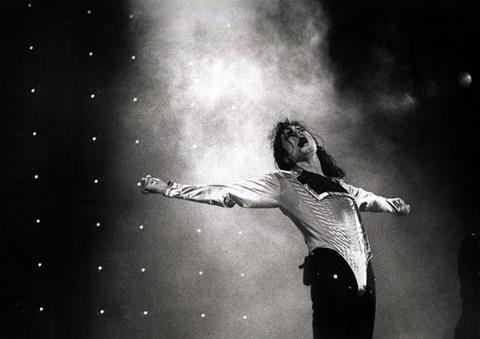Following recent reports that Michael Jackson accepted Christ just days before his death, AJ Gomez investigates the King of Pop’s faith journey

“…I got to [Michael Jackson’s] funeral, and Sandra Crouch and Seth Riggs, his vocal coach, says ‘Michael received Christ two weeks ago,’ he had us pray with him, he did the sinner’s prayer.”
That’s the claim made by music producer Rodney “Darkchild” Jerkins during a recent interview on the US radio show, The Breakfast Club.
Did the King of Pop really make a last-minute profession of Christian faith just days before his death?
Raised in the Watchtower
Michael Jackson was born into a religious home shaped by the convictions of his mother, Katherine.
Raised Baptist and then Lutheran, Katherine became disillusioned with both after discovering that some pastors were having extramarital affairs. In 1963, when Michael was just five years old, she became a Jehovah’s Witness — baptised in the swimming pool at Roosevelt High in Gary, Indiana. From that point on, faith became a core part of family life.
“She asked that the rest of the family get dressed in their best clothes every Sunday and walk with her to the Kingdom Hall,” writes J. Randy Taraborrelli in Michael Jackson: The Magic and the Madness.
The core doctrines of Jehovah’s Witnesses differ significantly from historic Christianity. JWs reject the Trinity and the full divinity of Christ, beliefs considered foundational in mainstream Christian theology. Nevertheless, Michael took his faith seriously. In La Toya: Growing Up in the Jackson Family, his sister recalls: “Michael and I were very active in the Jehovah’s Witness faith… Five days a week the two of us and Mother studied the Bible at home and attended the Kingdom Hall. Every morning Michael and I witnessed, knocking on doors around Los Angeles, spreading the word of Jehovah.”
As his fame grew, public ministry became more difficult. La Toya writes that Michael began to wear disguises — including, at one point, a rubber fat suit — to avoid recognition while going door-to-door.
By 1983, cracks had begun to show in Jackson’s faith. Even though he filmed a disclaimer and created an alternative edit to appease Jehovah’s Witness elders, his ‘Thriller’ video stirred concern among church leaders for its supernatural themes.
By 1987, he had officially severed ties. According to the Los Angeles Times, a representative from his Woodland Hills congregation confirmed that Jackson had “disassociated” himself from the church and no longer wished to be known as a Jehovah’s Witness. A letter from the organisation’s Brooklyn headquarters dated May 18 that year stated he was no longer considered a member.
He also expressed caution around organised religion more generally. In a 1976 interview for Ebony magazine — more than a decade before his official departure from the Jehovah’s Witnesses — Jackson said: “I avoid using the term ‘religion’, because many people say ‘my religion this and my religion that’. Why should it be ‘my’ religion? I just believe what’s in the Bible… I get down on my knees every night and thank God and ask Him to lead the way.”
Searching Beyond the Watchtower
Though Jackson left the Jehovah’s Witnesses, he didn’t abandon spirituality. Instead, his journey became more private — seemingly less tied to denomination, more focused on personal conviction.
Friends and collaborators described him as someone who read the Bible, prayed often, and openly referenced God in his day-to-day life. His lyrics — especially in ‘Keep the Faith’, ‘Will You Be There’, and ‘Speechless’ — reveal a longing for something transcendent.
Jackson frequently spoke about his care for children being rooted in the desire to be Christ-like — a theme that appears repeatedly in his interviews. For example, in 1993 he told Oprah Winfrey: “I try to imitate Jesus — and I am not saying I am Jesus. I’m trying to imitate Jesus in the fact that he said to be like children, to love children, to be as pure as children, to make yourself as innocent and to see the world through eyes of wonderment and the whole magical quality of it all.”
Twelve years later, speaking to Geraldo Rivera on Fox News, he echoed the same sentiment when asked what motivated his humanitarian work: “Caring and reading the Bible, learning about God… Jesus said bring on the children, imitate children…We were raised with those values…and they continue strong in us today.”
For those who believe he was guilty of child sexual abuse — allegations the singer consistently denied and which were never proven in court — his emphasis on children may be difficult to read.
A Moment of Prayer During Trial
In 2003, while Jackson was on trial for child molestation charges, he reached out to Rodney Jerkins for support. Jerkins was a prominent music producer and the son of an evangelical pastor. Known for his outspoken Christian faith, Jerkins worked closely with Jackson on multiple projects.
Jerkins recalls receiving a call during that period: “Michael called me to pray for him. I’m in the studio in 2003 with Chris Tucker, my father, and he was going through that trial. He said, ‘Where are you? Can I come? I just need prayer.’”
Notably, both Jerkins’ father and actor Chris Tucker were devout, Bible-believing Christians — with Tucker having recently become born-again. The fact that Jackson turned to such figures for prayer suggests that he may have been looking for spiritual clarity outside of his former religious beliefs.
Gospel legends Andraé and Sandra Crouch also confirmed Jackson’s deepening spiritual interests. “Michael always had a respect and curiosity for spiritual things,” they said. In the final months of his life, the Crouches visited Jackson twice — once at his home and once in the studio.
“During our meeting, not unlike many other creative/music meetings we’ve had with him in the past, we sang together, prayed together and had a wonderful time.”
According to their spokesperson, Jackson had requested prayer “concerning the anointing of the Holy Spirit,” and asked how to make his music more “spiritual.”
“Andraé and Sandra explained to him about the anointing and about Jesus,” the spokesperson added.
Conflicting Claims
Still, the question of whether Jackson ever made a formal Christian commitment remains contested.
In his Breakfast Club interview, Jerkins claimed that Sandra Crouch and vocal coach Seth Riggs told him Jackson had prayed the sinner’s prayer just two weeks before his death. Yet shortly after Jackson passed away, the Crouches issued a public clarification: “Several media outlets have been erroneously reporting that we met our dear friend Michael Jackson several weeks prior to his death so he could accept Christ. This is incorrect and absolutely not true.”
These conflicting accounts raise questions. Was Jerkins misinformed, misunderstood, or referencing a separate moment? The latter is plausible. Jerkins specifically mentioned Sandra Crouch and Seth Riggs, Michael’s vocal coach, while the public denial came from Sandra and her brother Andraé Crouch, who stated that Jackson had not made a profession of faith in their presence. It’s possible that Jerkins referred to a different event — one in which Andraé Crouch was not involved.
It’s also possible that neither Sandra Crouch nor Seth Riggs were directly involved in Jackson’s profession of faith but were simply made aware of it and passed the information on to Jerkins in good faith.
Much is to be speculated but what is certain is that Jackson himself never publicly confirmed any change in religious identity in his final days.
It’s easy to try to categorise someone’s salvation from the outside. But only God knows the heart. Whether Jackson ever replaced his Jehovah Witness beliefs with more orthodox Christian beliefs is something we may never know. But if salvation is a matter of the heart, then perhaps the most honest answer to the question is also the simplest: only God knows.






































1 Reader's comment